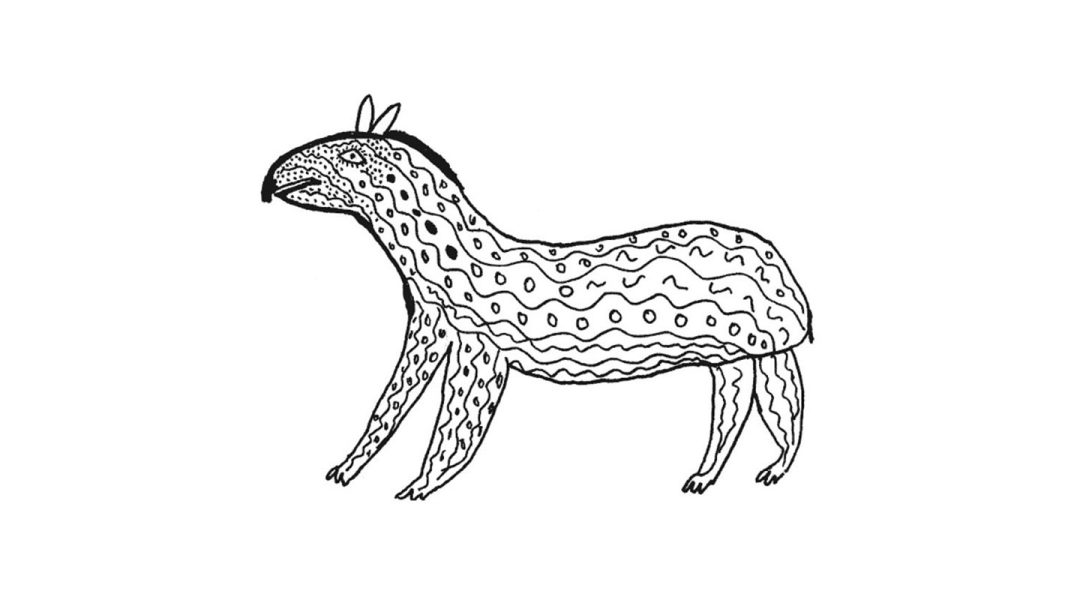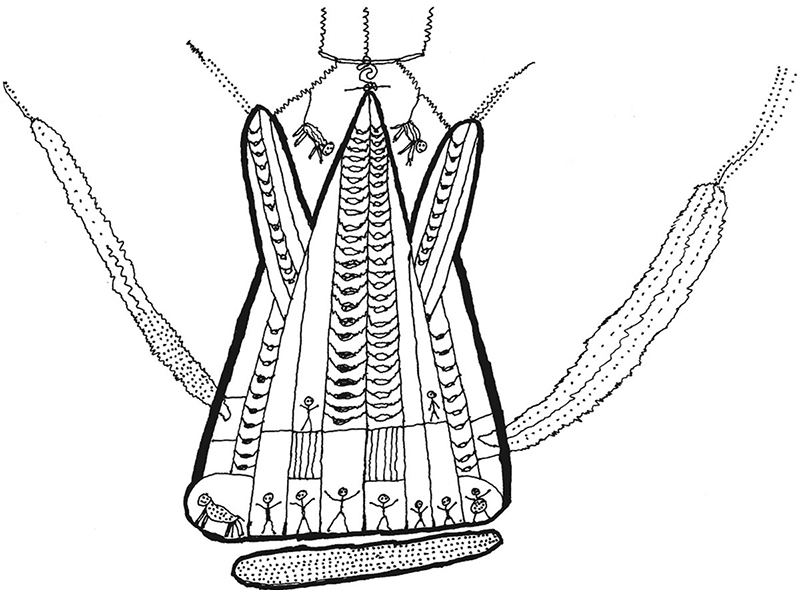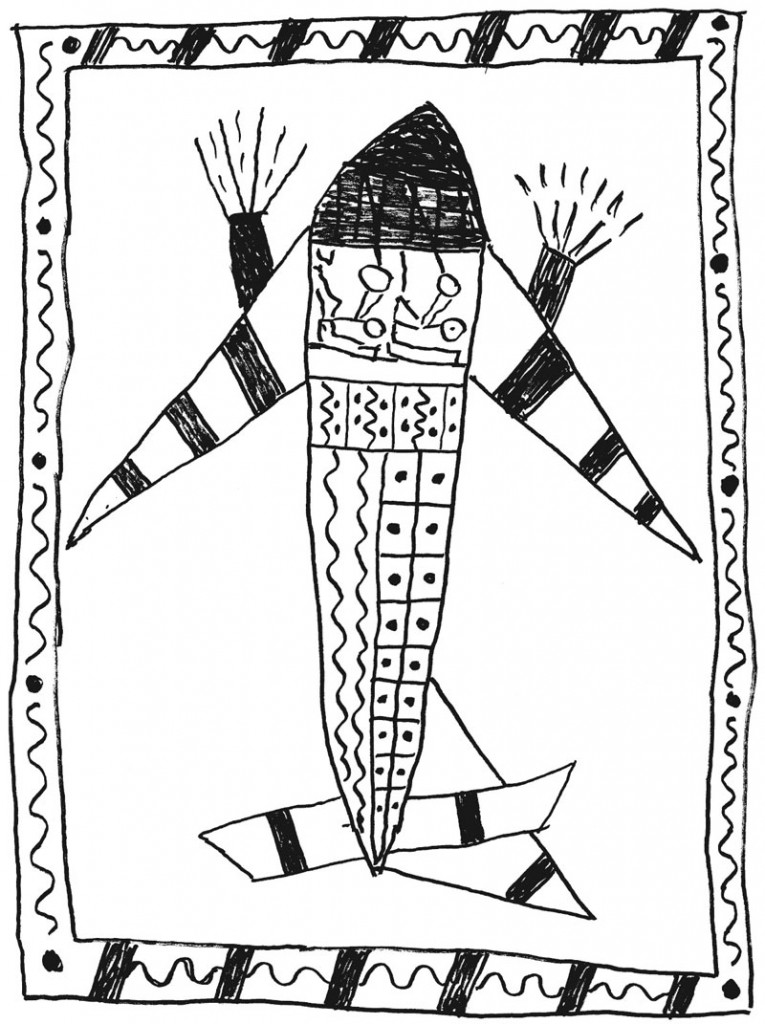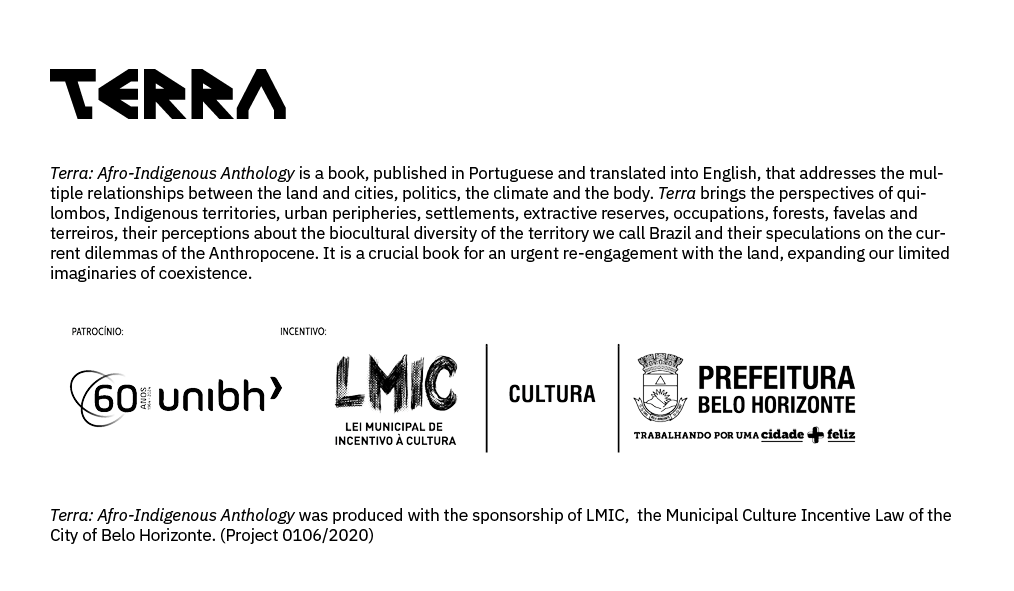
Në Ropë
Text and drawings by Davi Kopenawa
You, napëpë, have called me. So we made the time to sit down and explain in order to open the minds of other napëpë, in the same way we do in our nightly speeches for our entire community. Let your thinking expand, get involved! You, napëpë, fall in love with your healthy forest-lands!
So it goes like this: the napëpë,(1) the men of authority for you; those influential men who live among you, they don’t know us. They don’t know our homes, they don’t know our forest-land; they only have eyes for other places, the men of authority for you, Those influential men who live among you, they don’t know us. They don’t know our homes, they don’t know our forest-land; they only have eyes for other places. Yet, I belong to the forest and that’s why I want to teach our wisdom to you, napëpë. We want to teach you, but you don’t think like we do. You hear us, but you don’t believe in our words. “The words of the Yanomami are truthful words! The Yanomami will pass their knowledge down to us; they will explain to us the way of life of their ancestors, for they have the wisdom!”. The napëpë don’t seem to believe that.
But why don’t the napëpë think like us? (Because) they don’t know that the birthplace of në ropë, of the richness of the forests, is our land; they don’t realize that! They only know their own lands. Consequently, these people only know about themselves. They think differently, they think of themselves first. Because of that, we will explain our wisdom to them. And why teach them our wisdom? Why teach them what truly saddens the napëpë? Because by doing that, we are indicating what is right in our own way, in a voice of our own.

Long ago, when our ancestors emerged, our creator Omama created this name: në ropë. Omama named në ropë and proclaimed: “Take good care of në ropë! If you live in the forest-land with në ropë, you will be nourished, you will live well and be healthy! You will be well and healthy to celebrate, and your children will also grow up healthy! Therefore, because you wake up well and healthy, awaken to this name: në ropë. Take hold of this name. When the food grows, invite one another, talk to one another, and share food with one another. Celebrate with one another!”. So said Omama.
As a Yanomami person, when I explain all this, I wonder if perhaps the napëpë will understand me, since they think differently. They did not establish friendly relations with the Yanomami people based on our roots. And since they didn’t initiate contact with us willing to be our friends, to this day they still don’t take us seriously. The napëpë should pronounce this: “No! These words are true! The Yanomami speak the truth! We, the white people, also speak the truth. That way, we can teach each other.” When we are able to learn with each other, we will feel that në ropë from the forest truly belongs to us. If we feel like në ropë is in fact ours, we will heartly take care of it and not ruin it. This is what I wanted to say to you, napëpë: You young men, you young women, and you older ones, I want to pass on our wisdom to you. When you learn our knowledge, your thoughts will awaken to it, and you will follow the right path.
In the early days, when our ancestors emerged, they were already working. First came the work of the leafcutter ant spirit, Koyori. Because that spirit appeared first, they planted në ropë: bananas, cassava, sugar cane, yams, peach palm, sweet potatoes… they planted farm foods. The first plant-beings people planted in the farm soil are në ropë. But në ropë is also in other foods, those fruit-bearing trees that grow in the wild: the bacaba and patauá palm trees, the buriti and açai berry trees, the abiu-fruit and the inga bean trees, the cocoa and cupuaçu trees. All these tree-beings of the forest are në ropë. We do not walk hand in hand: the napëpë think one way, and we Yanomami think another, that’s how it is. Në ropë makes us happy! And why do we stay happy? Because we plant food in the fields and our food grows in the fields. And by growing these plants, we feed ourselves, and that makes us happy! But different things make the napëpë happy. They are happy with the food, but money also makes them very happy! Oil makes them happy! Flying in airplanes makes them happy! They are happy with the cars as well. Having a beautiful and shiny house makes them happy. Ice-cold water also makes the napëpë happy. Making others work for them or having influential men give them jobs makes them happy. There are many napëpë who live happily! But në ropë does not make them happy!
But us, në ropë makes us happy! The forest-land, the soil, they make us happy. Në ropë makes the food grow, feeds us, allows us to live well and in good health, quenches our thirst, helps us have clean water, and keeps the rivers where we bathe in clean. Because we carry on this way, dancing with each other, singing together, and holding our funeral festivals as one, në ropë brings us joy. We are happy with the shamans, because they bear the responsibility for our health. It is them who bring në ropë. Në ropë dances through the shamans. So, all of this is what makes us happy. Nourishment truly makes us happy! Shamans make us happy! The napëpë are not interested in these things. Some might even be interested, connected to it, but others won’t get there. For that reason, these people just think this way: “No! They are from other lands, let us not listen to them! Do these people work like us?”
It is through writing that the napëpë learn. If there is nothing written and if I just keep on making speeches aimlessly, the napëpë won’t take me seriously and will quickly think like this: “No! That is a lie! He is just thinking that for nothing!” They listen, but then, when they leave, they have already forgotten what I said. They move on only paying attention to the things moved by passion, to what really captures their attention.
We, the Yanomami, put our thoughts in the fields. We keep our thoughts focused on në ropë. Since we tie our thoughts to në ropë, we think like this: “Let’s get to work, let’s tend to the fields, let’s work with our arms, our hands!” All this is what distinguishes our thinking. Our thoughts are fixed on në ropë, that’s what we think about first, and in this way, our thoughts are at peace, they are settled and serene… So this is what I tell you for you to translate. After you translate, write it in the language of the napëpë so that the young men and women who are in their pathways to adulthood can hear me. When you hear these words and transport yourselves from yours into our thoughts – when you delve into our way of thinking – you will perceive our roots deep within you. But for as long as you are unable to see our roots, our thoughts won’t come to you, and you won’t exclaim surprisingly: “Here! Why haven’t we thought about that!”
When we look at the roots that make food grow, the roots whereby në ropë moves along, we Yanomami shamans can see their trails, even though other Yanomami can’t. The napëpë farmers, however, do not see the trails of në ropë; they know the paths of other things. Because they already know a particular path, they reinforce their thought on that path: “Ah! I’m going to get my vehicle; I’m going to get my tractor to work! If I don’t have my tractor, I will be in trouble; without employees to work for me, there’s not going to be a way!” That is what the napëpë dwell upon. We do not suffer for those things! Our ancestors opened fields with stone axes, so we know how to deal with struggles. We are explaining this to people from different places because if people have more knowledge about where në ropë manifests, more understanding about what në ropë really is, they will know how to care for and protect it! That’s what I want to say.
Where there is në ropë, where në ropë spreads to, the napëpë only know how to ruin it! They cut down the trees and then burn them! After burning them, they remove what remains with a tractor. The napëpë only work denuding the forest-land! Working is good, but you really need to learn how to protect the forest! Në ropë in fact lives in the soil and on the surface, it sustains our good and healthy life. That’s the importance of protecting the forest today! Put an end to what is happening today. Never say, “I am going to destroy this forest because it exists with no purpose! It is just standing there, for no reason at all!” Don’t think that way! Be vigilant! Awaken your thoughts! Be aware of what you are eating! If there’s no në ropë, how will we survive?
It is also në ropë that makes us breathe fresh air, helps us stay focused, and work well. It is what makes us happy! We will feed on në ropë; after feeding we will be satisfied, and only then will we be strong!

When the napëpë spoil the forest, në ropë runs away, it goes to another land. When në ropë flees, the napëpë will plant food in the soil, but it won’t grow! Only Ohinari, the spirit of hunger, will remain in the place. And when we don’t eat, we become weak! People won’t be able to stand on their own, to bend down… they will just lie down. They won’t get up in the morning, and go anywhere. That is what Ohinari does. Ohinari is very fierce! It doesn’t make friends with us. Ohinari makes us suffer, it doesn’t want to see us happy and healthy! While në ropë wants us to live well and in good health, Ohinari wants us to die, to die of thirst and hunger. The napëpë do not harbor these words, they don’t understand them.
We Yanomami sniff yakoana, we become shamans and see the path of në ropë. Those great men who can see the path of në ropë, invoke it, and so food grows throughout the entire forest-land and in all the fields! Fruits appear in the forest, animals eat them and fish too: peccaries, monkeys, tapirs and other animals eat them. Therefore, you napëpë open your minds and think: “It’s true!”. Don’t ask yourselves: “Where is në ropë?”. There in your land there is në ropë too, and it’s because there is në ropë that you can feed yourselves. You feed yourselves, raise cattle, and thus eat meat. You also eat fish and fruits. After you grow your fruits, you make juice from them to quench your thirst!
So it is along the path of në ropë that your thoughts need to go today. Both our thoughts, Yanomami’s and napëpë‘s. When we lift our eyes and see this, we become aware: “So this is the way to live in good health, it’s on this forest-land that we thrive and live well! All of us: napëpë, Yanomami, children, and the youth!” So take care of the forest. This is the truth! You who are in schools, you who are there to learn, listen to this, see these words of mine on paper! If you haven’t learned it, if you haven’t heard about it, now the people of the forest are teaching you, so from now on, you start thinking like this: “Let’s listen to them, let’s take them seriously.” My words are true! They are not a lie! Other napëpë haven’t taught you this before.
We Yanomami have our children, and therefore, our elders will blow into their nostrils, teaching them to be shamans. Since this is a way for them to study, when they see the xapiripë;(2) the xapiripë will explain, and the children will learn. Since you learn through writing, put these words in writing so that young napëpë can read them! So that their eyes fall upon the path of në ropë, so that their eyes land in the middle of the path of në ropë, and when they land there, when they truly see it, they will say: “Look! It’s different among them! We napëpë think differently!” Nowadays, we who are from the same generation can understand. We have knowledge and what we know we will teach one another.

You, napëpë, have called me. So we made the time to sit down and explain in order to open the minds of other napëpë. That’s what I wanted to say, in the same way we do in our nightly speeches for our entire community. When I give these speeches in my home, those who are still growing up agree with me, they listen and think: “It’s true! If I don’t go hunting, I won’t eat! I won’t return with a game. If I don’t work, food doesn’t grow, because food doesn’t grow for no reason. When I work, I dig a hole in the ground, I put the seedling in the hole, and after six months food grows and we eat it.” That’s what I teach our young ones, so they do things this way. Others who don’t work go hungry! They keep asking, “I want food! I don’t have my food! I didn’t grow anything!” Those lazy ones say that. But those who are diligent, who know how to work in the field, they eat! They nourish themselves. We eat në ropë, and në ropë makes us live well and healthy. Në ropë keeps our eyes focused on the health of our forest-land.
Omama, who created us, spoke the Yanomami language. For me, the way that he did is the right way. The words in our language are clear; the speeches of the hereamu(3) are clear, as are the ceremonial dialogues during festivals, which I also understand. There are also shamanic chants. Of all these, only the shamanic chants are very difficult. You napëpë do not understand those words. The shamans speak Yanomami, but they use a very complex language! It is in these difficult words that the shamans truly pick up the trail of në ropë, other Yanomami do not pick up this trail. But since the shamans have the trail of në ropë, they can show other Yanomami where the trail is, saying: “Look! This is the path of në ropë, do your work right here! When you are hungry, call në ropë. When you call him, throw away the land that is infertile, and then, në ropë will emerge again. It will come back, it will be good again, and then you will be able to eat! That way you will be happy!”
Because of this, Omama said: “Në ropë doesn’t die! Në ropë is very great!” We will die, and you napëpë will die; even though you feed yourselves, you will also die. We Yanomami, even though we are nourished by në ropë, we will die. As for në ropë dying, that is something hard to happen! When the ground cracks open and we see the end of skies, only then will në ropë be no more! That’s what we think, that’s what we say. When në ropë flees, the earth shatters. The leaves of the trees age and fall, the trunks dry up, and then në ropë runs away. There in other lands, when në ropë lies down in other lands, when it goes away and ascends to the world of spirits, Ohinari, the spirit of hunger will take over the land we are living in. When Ohinari comes around, we won’t be able to feed ourselves again. So, në ropë doesn’t die; it just runs away. You see, napëpë, if you keep on spoiling the land and the soil all the time, the consequences will be devastating! Today, everything seems fine; today, you can feed yourselves. The young ones are able to go to school and learn because they have been well fed; because you have eaten well, today you are full of health, you can work and run around with your bellies satisfied! That’s why we want to help the young people expand their thinking; take them further. Let your thinking expand, get involved! You, napëpë, fall in love with your healthy forest-lands!
The thinking of this new generation is still expanding. We think our thinking is broad, but it’s not! Our thinking doesn’t fall in love like that. If we don’t work and walk down the right path, those napëpë who own goods, who destroy the land, who keep spoiling the forest with no reason at all, will make us suffer!
You have to teach your children to think right! Teach your children this: “Children, be smart! When you grow up in this land, in this soil, make në ropë grow! Take në ropë as your authority. If we don’t have në ropë, we won’t live well and healthy!” Talk about this with your children. Nowadays, those who teach in universities, if they don’t show the right path, people will do things differently! They will become divergent people. They will become senators, deputies, or other types of politicians who don’t respect us, and that is very bad! For me, this is not good at all! But for the napëpë, in their own land, this might even seem good. However, deep down, this is inconsistent. Their roots become like feces, like dirty garbage, so that’s why young and old people alike, you are sad! You are already sad because a different disease has appeared! This has already started, and you keep asking yourself: “How did this happen without any reason?” In your land, the waters are already polluted; the dam in Brumadinho burst, and many napëpë died! There were many beautiful mountains in Minas Gerais, but some napëpë entrepreneurs ruined the land with their tractors and spoiled the land’s në ropë. They turned it all into a disease, and because of that, the forest became full of diseases, and the food stopped growing healthy, so that is what became of it, that is what is becoming of it…
If the napëpë worked in the fields only, we would not have epidemics. We wouldn’t suffer from diseases. But since they deal with minerals, since they extract epidemics from the depths of the earth, since they burn minerals, all napëpë, whether women, children, young, or old, have chest problems, cancer, and other diseases that Yoasi(4) had hidden deep into the earth. But as mining has brought them from the depths of the earth, cities are sickened. The napëpë think, “We white people multiply! We multiply!” Despite that, diseases are gradually killing them. So teach your children to be wise. If they grow up with wisdom, they will eat well and be healthy in the future!
On that same account, my words about në ropë are for all of us to continue living well and healthy, that’s what they are all about. They are all about people from all lands being able to eat; about everyone in the whole world being fed! In other lands, what do people eat? Real food! It’s really në ropë! They eat leaves from në ropë, they eat mushrooms from në ropë, and the water we drink is also në ropë! Në ropë is very good water! If there is no water, how will we survive? Will you drink your own urine? If there is no food, will you eat your own feces? Will you eat rocks? No! Në ropë, as you napëpë would say in your own language, is a “fundamental priority”. That’s why we want to teach this wisdom to the youth.
If you, napëpë, want to become wise, you need to fall in love with the path of në ropë; you really need to connect with në ropë! You have to take it seriously and say, “Yes! It’s true! Në ropë is very good! Në ropë is health! Në ropë is what quenches our thirst, në ropë is what makes us live well and healthy, it’s what brings forth new children!”. So you, napëpë, need to think like that too. That’s what I wanted to say.
–

Davi Kopenawa is a shaman and indigenous leader, spokesperson for the Yanomami cause, activist in defense of indigenous peoples and the Amazon rainforest. He is the president of the Hutukara Yanomami Association and the author of “A queda do céu: Palavras de um xamã yanomami” (2015) and “O espírito da floresta” (2023), both published by Cia. das Letras, with the anthropologist Bruce Albert.
This essay was originally published in Portuguese in the book Terra: antogia afro-indígena (PISEAGRAMA + UBU, 2023). It was translated from the Yanomami by Ana Maria Machado and translated into English by Monyque Assis Suzano in collaboration with Maria Bernadete Morosini.
How to quote
KOPENAWA, Davi. Në Ropë. PISEAGRAMA Magazine. Online version, Read in English Section. Belo Horizonte, December 2023.
Notes
1 Napë, in the Yanomami language, means non-Yanomami person; enemy; outsider. Napëpë is the term with the added pluralizing morpheme (pë) – enemies; white people; outsiders. Currently, the term napë has come to mainly refer to non-indigenous people; white people.
2 In Yanomami mythology, xapiripë is the pluralized form of how people refer to the spirits or animal ancestors that appear to shamans during their dance and chants performances.
3 A hereamu is a Yanomami tradition, in which individuals gather in a circle to share their everyday stories, struggles and dreams; a moment also dedicated to collective decisions.
4 In Yanomami mythology, Yoasi is the mischievous brother of Omama, described as the one who always disrupts his brother’s good deeds during the creation of the world and the Yanomami. Yoasi is associated with the origin of short life and diseases, for example. Yoasi would be responsible for placing death alongside the minerals that Omama hid deep in the earth, and that Yoasi is said to have revealed to the napëpë where these minerals were hidden.
This essay is an adaptation of Davi Kopenawa’s words originally included in the catalog of the exhibition Indigenous Worlds, organized by Ana Maria R. Gomes, Deborah Lima, Mariana Oliveira, and Renata Marquez at UFMG Museum, Belo Horizonte, Brazil, from 2019-2023. The text emerged from conversations with the author and was transcribed and translated from Yanomami into Portuguese by Ana Maria Machado.
Lire en Française dans Les Temps qui Restent